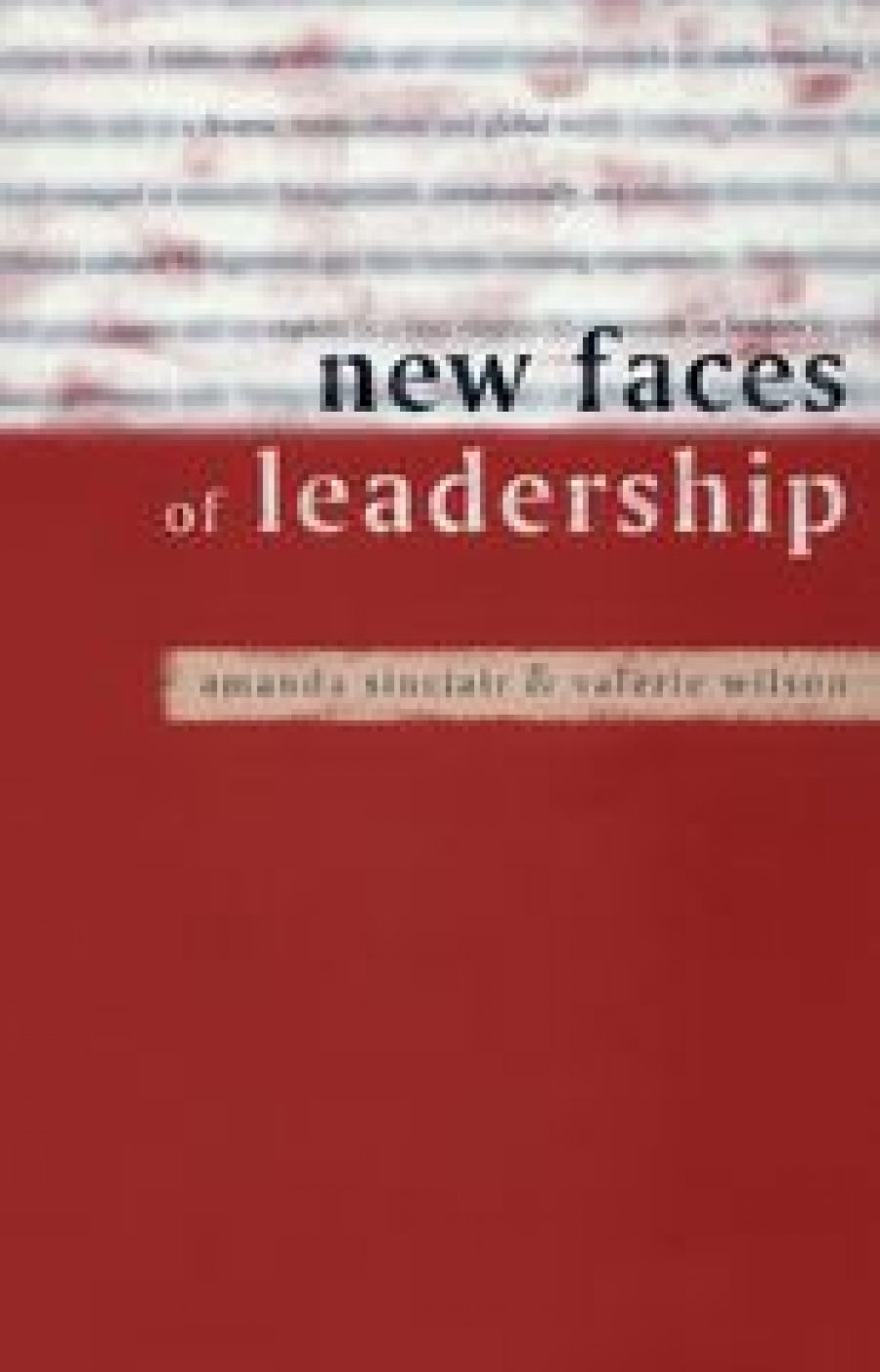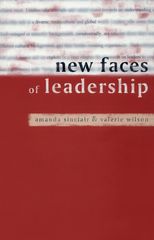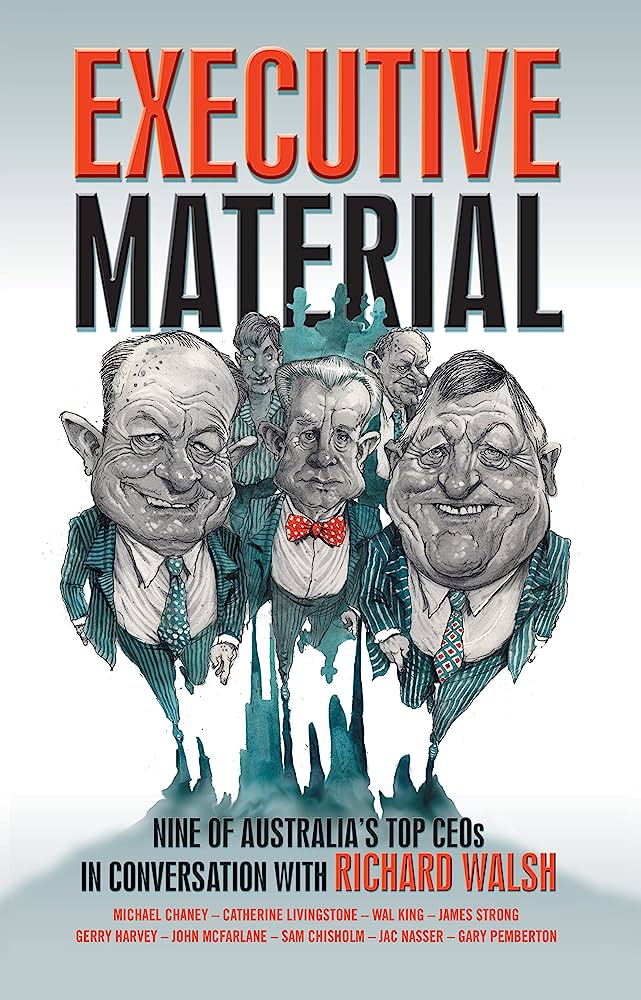
- Free Article: No
- Contents Category: Business
- Review Article: Yes
- Article Title: Cappo Commies
- Online Only: No
- Custom Highlight Text:
Big business is a kind of communism. Employees in their vertical villages banter this truth, checking over their shoulders for fear an office spy is eavesdropping. It is a communism that aims for the inequitable distribution of wealth, just as traditional communism aims for the inequitable distribution of poverty. It is the People’s Republic of Capitalism (PRC). Its languages are Bluff and Spin and Acronym. It is always ‘strong and growing’; always ‘resilient and facing up to new challenges’, with the CEO pursuing higher EBIT and better KPIs before the all-important IPO. It is active in funding charities and the arts.
- Book 1 Title: New Faces of Leadership
- Book 1 Biblio: MUP, $12.95pb, 145 pp
- Book 1 Cover Small (400 x 600):

- Book 1 Cover (800 x 1200):

- Book 2 Title: Executive Material
- Book 2 Subtitle: nine of Australia’s top CEO’s in conversation with Richard Walsh
- Book 2 Biblio: Allen & Unwin, $29.95pb, 245 pp
- Book 2 Cover Small (400 x 600):

- Book 2 Cover (800 x 1200):

On the top floor of each soaring tower is the rarely seen president: at best a charismatic demigod, feared, admired, mostly feared; at worst, an uncharismatic demigod, feared and despised by the functionaries, those cowering bureaucrats he rules over. For big business is bureaucracy. Tiers and tears of it. ‘Good morning, Mr One Of Us. Flash your security pass and you’re in there. Beep go the lift’s doors on contact with your swipe card. Fill out this roster sheet, that claim form. Drop your leave application in my pigeon hole.’
It is communism with snappier uniforms. Male apparatchiks: sombre suits, black shoes, white shirt, ties with blue in them, shoulders stooped from too much desk-work, bespectacled, jogging at lunch in ‘Hong Kong Sevens’ T-shirts. Female: long blonde hair framing each side of her face, stiletto shoes, spectacles eye-slit narrow whether she needs to wear them or not (good communism causes poor eyesight), fingernails protruding exactly 0.5 centimetres from the quick, diamond and ruby friendship ring permanently on the marriage finger, also known as the divorce finger. Water sustains life – mineral water that is – but in the PRC so does a hierarchy of perks and privileges: superannuation, lunches, dinners, car package, best seats at the footy, opera, ballet, share options, medical benefits, insurance discounts, cheap loans, counselling, expense allowance, gymnasium membership, MBA course sponsorship, private school fees assistance, overseas travel. Oh yes, and optometric subsidies.
The dutiful learn to say these: ‘Core philosophies’, ‘We want your input’, ‘Appreciate your feedback’. They learn this rule: ‘Two hundred metres from the workplace can still, technically, be your work. Therefore, that Friday night drink can become a sexual harassment claim.’
It’s communism of a temporary variety. No one follows you home unless you’re rorting Workcover. Once there, your life is your business. But it can lay you off if you’re no longer useful. It can send you to Siberia if you fall out of favour – appoint you corporate affairs manager of the Broome office.
If you are found to be planning to defect to another company, you will be offered more money or perks, if you’re valued, or given five minutes to pack your things and marched from your desk to the front door by a security guard, if you’re not. This is common. Companies swap leaders and workers all the time: they are corporate citizens and, if their credentials are in order, hold a passport for any country — I mean company. For companies are countries. Their earnings can be the size of New Zealand’s GDP, though they have populations of 40,000 or so. If these empires become too unwieldy, their leaders demerger them, strip assets, offload unwanted add-ons and divisions, as if these things were Uzbekistan. They extract tax from customers for using their products and services, and call it income and profits.
Régimes sometimes go to paper war, one raiding another’s share register to buy it up. The casualties are never killed. They’re paid out and slink away, not speaking to The Press except via a press release. The Press is also a country, known as The Fourth Estate, considered a neutral nation like Switzerland, unless you get it offside, or onside.
The Economist is the PRC’s Das Kapital. But other reading matter for PRC citizens’ educational entertainment includes the recently released thesis/book New Faces of Leadership, by Amanda Sinclair and Valerie Wilson. According to the index, the book is part of a project promoting multiculturalism in business. It has chapters with titles such as ‘The Routes to Leadership: The Insiders, The Outsiders, Multiple Pathways’. It contains insights, comical in their obviousness (communism has always been misrepresented as humourless), such as: ‘Early influences and experiences have affected the pathways taken by our leaders.’ But it also presents interesting findings about the PRC’s current leadership. More and more these days, ‘Outsiders’ – people with non-Anglo-Saxon backgrounds – are ‘border crossing’ to become insiders. Absent or distant fathers may help Anglo-Saxon men achieve. Being born down the pecking order in a large family may also give you a kick along. Female political leaders tend to be the first born in all-girl families.
There’s also Executive Material, a book-length set of transcripts of con-versations between a Fourth Estate ambassador to the PRC, Richard Walsh, and nine Australian CEO’s: Wesfarmer’s Michael Chaney, former Qantas chief James Strong, former Ford boss Jac Nassar, ANZ supremo John McFarlane – people of that ilk, who belong to that unofficial council of achievers: The High Flyers.
This transcript technique allows aspiring CEOs or wannabe senior comrades to digest the wisdom and doctrine of these eight great men, and one great woman, without the bourgeois artifice of prose obstructing the flow of their inspirational guidance. Nor does Ambassador Walsh prod them with anything but reverential questioning. The effect is to present a nuts-and-bolts book of hints for Low- and Mid-Level Flyers who probably don’t need these hints in the first place, being so clued up from years of business study and workplace indoctrination. They know how to create a top twenty per cent company/country: get sixteen per cent return on equity. They know that psychological testing to measure a person’s EQ (emotional intelligence) is a good way to weed out comrades from the executive ranks. They know that if they’re not successful in their twenties they will never be. They know the PRC expects them to be ‘goal-orientated’ and ‘self-directed’ if they’re to be leaders. But it’s motivational to get it from the horse’s mouth. And Ambassador Walsh asks the odd personal question, albeit on a ‘Tell me about your origins?’ level, to prove that horses are only human.


Comments powered by CComment